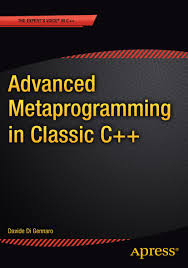Index of “Advanced Metaprogramming in Classic C++” by Davide Di Gennaro
- Introduction to Metaprogramming
- What is Metaprogramming?
- Benefits and Challenges
- Overview of C++ Metaprogramming
- Templates and Compile-Time Computation
- Template Basics
- Template Specialization
- Non-Type Template Parameters
- Variadic Templates
- Type Traits
- Understanding Type Traits
- Custom Type Traits
- Using Type Traits for Type Manipulation
- Policy-Based Design
- What is Policy-Based Design?
- Implementing Policy Classes
- Combining Policies
- Boost MPL (MetaProgramming Library)
- Introduction to Boost MPL
- Sequence and Algorithmic Operations
- Advanced Use Cases
- SFINAE (Substitution Failure Is Not An Error)
- Concept and Usage
- Implementing SFINAE Techniques
- Practical Examples
- Expression Templates
- What are Expression Templates?
- Implementing Expression Templates
- Optimization Techniques
- Advanced Template Techniques
- Template Metaprogramming Idioms
- Recursive Templates
- Meta-Functions and Meta-Programming Constructs
- Design Patterns and Idioms
- Common Metaprogramming Patterns
- Idioms in C++ Metaprogramming
- Case Studies
- Practical Applications
- Metaprogramming in Real-World Projects
- Performance Considerations
- Debugging and Testing Metaprograms
Introduction
Introduction to Metaprogramming
Metaprogramming in C++ refers to the technique of writing programs that manipulate other programs or themselves at compile time. This powerful feature allows developers to perform computations and enforce constraints during compilation, resulting in highly efficient and flexible code. “Advanced Metaprogramming in Classic C++” aims to provide an in-depth exploration of this fascinating aspect of C++ programming.
The book begins with an introduction to the fundamental concepts of metaprogramming, discussing its benefits and potential challenges. By leveraging the powerful features of C++ templates, developers can create highly generic and reusable components. The subsequent chapters delve into various advanced metaprogramming techniques, including template specialization, type traits, and policy-based design.
One of the key resources for metaprogramming in C++ is the Boost MetaProgramming Library (MPL). The book covers how to use Boost MPL effectively, offering practical examples and advanced use cases. Additionally, the concept of SFINAE (Substitution Failure Is Not An Error) is explained, providing insight into its practical applications.
Expression templates, another powerful metaprogramming technique, are discussed in detail, showcasing how they can be used to optimize code. The book also explores advanced template techniques, including recursive templates and meta-functions, offering readers a deep understanding of these constructs.
Throughout the book, readers will encounter common design patterns and idioms used in metaprogramming, illustrated through case studies and real-world examples. The final chapters focus on practical applications, discussing how metaprogramming can be applied in real-world projects, along with considerations for performance, debugging, and testing.
By the end of this book, readers will have a comprehensive understanding of advanced metaprogramming in C++ and be equipped with the skills to implement these techniques in their own projects.
